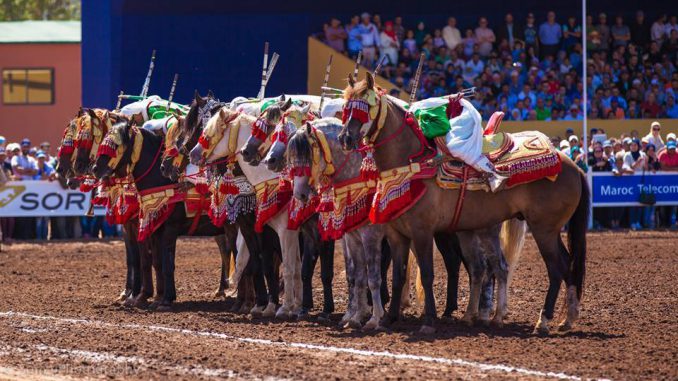
The Intergovernmental Committee for the Safeguarding of the Intangible Cultural Heritage of UNESCO, meeting on 15 December, within the framework of its sixteenth session, responded favourably to the candidature of the Kingdom of Morocco for the inscription of the Tbourida on the Representative List of the Intangible Cultural Heritage of Humanity.
The Permanent Delegation of the Kingdom of Morocco to the United Nations Educational, Scientific and Cultural Organization, represented by Ambassador Samir Addahre, welcomes this inscription, which constitutes an international recognition of an Arab-Amazigh civilizational heritage that is unique in the world and to which Moroccans are very attached. The inscription of this artistic expression on the UNESCO List bears witness to the importance of this legacy, which is deeply rooted in the collective consciousness of Moroccans and their multi-millennial history.
On this occasion, the Ambassador, Permanent Delegate of the Kingdom to UNESCO, expressed his thanks to the evaluation body, to the members of the Committee as well as to the Secretariat of the 2003 Convention for their remarkable work, affirming that Morocco and its delegation to UNESCO are “extremely grateful” for this inscription on the representative list of the intangible cultural heritage of humanity.
Tbourida is a practice that establishes a strong relationship between man and horse and encompasses a repertoire of traditional music and songs that celebrate this traditional art and its riders, the Moroccan diplomat noted, adding that in order to protect its intangible heritage, “Morocco has enshrined in its own Constitution respect for and safeguarding of its cultural diversity, Amazigh, Hassan, Arab, African and Jewish, thanks to the commendable commitment of HM King Mohammed VI.
For the president of the body evaluating the candidacies, the nomination submitted by Morocco meets the five criteria required by the Intergovernmental Committee for the Safeguarding of the Intangible Cultural Heritage of UNESCO, noting that the Tbourida has an importance for the cultural identity and collective memory of Morocco and its communities and contributes to sustainable development through the breeding of horses and the manufacture of clothing and saddles from local materials.
“The evaluation body congratulates Morocco for having taken measures to ensure the care of the horses and the eventual renewal of their populations,” she added, noting that the nomination process involved the participation of the communities concerned and was initiated by various troupes and associations. Taking these elements into account, the evaluation body recommended that Tbourida be inscribed on UNESCO’s Representative List of the Intangible Cultural Heritage of Humanity. Subsequently, the Bureau of the Unesco Intangible Cultural Heritage Committee, which did not receive any request for debate or amendment, proceeded to adopt, without objection, the draft decision on the inscription of this Moroccan ancestral art to the Intangible Heritage of Humanity.
Tbourida, also known as Fantasia, is a constituent element of the intangible cultural heritage of the Kingdom of Morocco, both in terms of oral traditions and expressions, performing arts, social practices, rituals and festive events, knowledge and practices concerning nature and the universe, as well as know-how related to traditional crafts. It is an integral part of the cultural identity and collective memory of the Kingdom of Morocco, its regions and communities. This inscription is the recognition of the social functions and cultural meanings of this ancestral traditional equestrian art, transmitted from generation to generation. Since its appearance, evaluated by historians in the 15th century, the Tbourida has contributed strongly to the sense of identity and continuity of Moroccans.
It should be noted that the transmission of the Tbourida is a real issue for the safeguarding of the Arab-Amazigh cultural and historical heritage. “Until the end of the 1990s, this tradition and its practice were in decline, notably due to the rural exodus. However, under the impetus of His Majesty King Mohammed VI, a revival of the Tbourida was initiated with the development of an ambitious state plan to safeguard it, notably by the Royal Moroccan Federation of Equestrian Sports and the Royal Society for the Encouragement of the Horse (SOREC). They are supported by several associations and private individuals involved in troupes who make this practice, which is spectacular and noble, a leisure activity, or even a real passion,” it is stated.
Tbourida is an invitation to accept the diversity and creativity of the Arab-Amazigh regions and customs. Its inscription today in the Representative List of the Intangible Cultural Heritage of Humanity of UNESCO is a recognition of the know-how of the holders of this tradition in their different roles. It will help to safeguard, perpetuate and considerably amplify the movement of creativity and respect for cultural diversity.

Be the first to comment